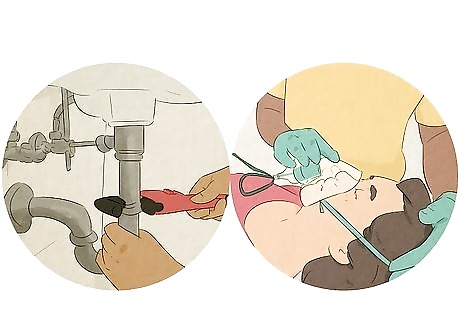
views
- Pave your own path by freelancing or starting your own business.
- Pursue a big goal, such as getting a job, going to college, studying abroad, or attending trade school.
- As another alternative, learn job skills by doing an internship or apprenticeship.
- Expand your world by volunteering or taking a gap year to travel.
Post-High School Paths

Pursue your passion by freelancing. Why not go after your dreams? To get started, create a work schedule for yourself and use that time to pursue clients, network, and create examples of your work. Find your first clients by offering your services to people you know. To figure out how much to charge, look at how much other freelancers in your field are charging. Create your own website with a list of your services and a portfolio of your work. You might be a photographer or be a tutor. Create a career portfolio if you’re offering writing or administrative services. You could become a virtual assistant or do copywriting. Make an art portfolio if you’re an artist.

Start your own business. Create your own path in life by starting your own small business. It’s easier than ever to begin a new business out of your home. To get started, write a business plan, name your business, and get your federal and state IDs. Once you have a business bank account, you can start earning that cash. Sell your crafts, such as art prints, jewelry, or home decor. Make and sell candles and bath products. Open a boutique. Create a service business, like landscaping, being a handyman, or cleaning houses. Open a home daycare. Build an online brand and be an influencer or professional gamer.

Learn a trade. Get a great job that pays well without going to college. Trade schools, which are also called career schools, teach you a skill that you can use to get a job. In most cases, you’ll take a few short classes and then take a licensing exam. Once you have your license or certification, you can start working. Here are some popular trades: Hair stylist Plumber HVAC technician Home Inspector Electrician Aircraft mechanic Landscaper Dental assistant Paramedic

Apply for an internship. During an internship, you get to try out a job without making a commitment, and you’ll make connections that’ll help you get a job in the future. It’ll also help you build up your resume. Apply for internships on local job sites or ask your parents’ friends if they have opportunities at their workplace. Make sure you find out whether or not you’ll be paid, as many internships are unpaid. You might do 2 or 3 internships in the year after you finish high school so you can see what type of work you like the best.

Get a paid apprenticeship. With an apprenticeship, you’ll earn skills on the job. It’s a great way to start earning money when you’re just starting out on a career path. Look for apprenticeships with local employers, or use the U.S. government's apprenticeship job finder. Here are some jobs that might offer an apprenticeship: Software developer IT specialist Chef Jeweler Banker

Take a gap year to travel. There’s a big world out there, and it’s at your fingertips. Why not visit places you’ve always dreamed of seeing up close? You can totally travel on a budget, so get out there and explore. Take a road trip through the U.S. Backpack through Europe Explore South America Teach English in Japan, China, or South Korea Trek around Africa Hike through the Australian outback

Study abroad. Most colleges and universities have study abroad programs. Generally, you’ll pick a program you want to study and apply through the college of your choice. You’ll be able to live and study in another country—what an amazing experience! You may be able to get a scholarship to study abroad, especially if you have a financial need. Ask your school if they offer financial aid packages.

Go to a college or university. Getting a college degree can open the doors to your dream job. Plus, you’ll make life-long memories with your college friends. Choose a college that offers a program that interests you and a campus that feels comfortable for you. Additionally, make sure your family can afford the school, and check how much financial aid you could receive. Get a feel for the colleges you’re interested in attending by going to college fairs and visiting the campuses of the schools you’re considering. When you’re picking your major, get advice from your school counselor and talk to people you know to see what they enjoy about their job. Additionally, think about the topics that interest you the most. You can start a bachelor’s degree at a 4-year college or do a 2-year associate’s degree at a community college. To save some cash, you might do your first two years at a community college and then move on to a 4-year school. EXPERT TIP Alicia Oglesby Alicia Oglesby Professional School Counselor Alicia Oglesby is a Professional School Counselor and the Director of School and College Counseling at Bishop McNamara High School outside of Washington DC. With over ten years of experience in counseling, Alicia specializes in academic advising, social-emotional skills, and career counseling. Alicia holds a BS in Psychology from Howard University and a Master’s in Clinical Counseling and Applied Psychology from Chestnut Hill College. She also studied Race and Mental Health at Virginia Tech. Alicia holds Professional School Counseling Certifications in both Washington DC and Pennsylvania. She has created a college counseling program in its entirety and developed five programs focused on application workshops, parent information workshops, essay writing collaborative, peer-reviewed application activities, and financial aid literacy events. Alicia Oglesby Alicia Oglesby Professional School Counselor Choosing the right college is about more than just the cost to attend. Look beyond the sticker price to consider more than just what tuition your family could realistically manage each year. Ensure the academic offerings match your interests and career aspirations. Get a feel for campus culture and vibe by taking tours and chatting with current students.

Get a job. What’s better than being independent? By entering the workforce, you can earn your own money and live the life you want. Start your job search by making a resume that lists your education, hobbies, and any work or volunteer experience you have. Then, apply for jobs on career websites like Indeed or Monster. Before you go in for an interview, practice with a trusted adult so you can develop your interviewing skills. Struggling to find a job? Job Corps is a government program that will help you learn career skills and find the right job for you. Some employers will pay for college classes. If you’d like to earn a degree, ask your boss if your workplace has this kind of program.

Volunteer with a service organization. Volunteering introduces you to new experiences and helps you learn about yourself. In some cases, you might get to travel for free and could learn about different cultures. Take a year to volunteer if you want to expand your world and help others. You could join: AmeriCorps allows you to volunteer for nonprofits. Peace Corps takes you all over the world to volunteer, usually for 2 years of service. VolunteerMatch helps you find volunteer opportunities in your area. United Way allows you to volunteer close to home or overseas. You’ll do things like mentoring, distributing food to people in need, and doing community service. Habitat for Humanity builds houses for economically disadvantaged families.

Join the military. The military helps you learn discipline and important life skills that will help you as you become an adult. Additionally, joining the military will help you get money for college when you’re ready to pursue a degree. Here’s a list of the different branches of the military you could join: Army Marines Navy Coast guard Air force Space force

Learn “adulting” skills. You’re officially a grown-up now, so you have a lot more freedom. As you spread your wings, though, you’ll also have new responsibilities. Taking good care of yourself is really empowering, and you’re going to do great. Get started with these basic skills that you’ll need to fly out of the nest: Learn how to cook a few recipes. Open your own bank account. Apply for a credit card so you can start building credit. Learn how to maintain your car. Make your own appointments at the doctor and dentist. Learn how to clean and do laundry. Start paying some bills.
Things to Consider

Imagine your ideal life in the future. You deserve to live a life you love, so take a few minutes to figure out what that looks like. Picture yourself in the future with the perfect job, your dream home and family, and a hobby you enjoy. Use this image to help you decide what path to take going forward. Ask yourself: What kind of job do I want? Does the career I want require a degree? What kind of workday feels right to me? Where do I want to live? The city? The country? My hometown? What kind of home do I want? An apartment? A house? A condo? Do I need lots of space, or will a small home be right for me? Do I want a partner anytime soon? Do I think I’ll want kids? When would I want to have kids? Will I want pets? How often do I want to travel? What do I want to do in my free time?

Talk to others about what they did. Listening to other people’s experiences can give you great insights into the different paths you could take. Ask your parents, older siblings, extended family, teachers, and counselor about their job history and their college experience. Use the advice that you think works best for you. “What did you do in the first year after high school?” “What did you like about college?” “Do you ever wish you’d taken a gap year?” “Do you think working during college was helpful?” “What advice would you give me if I start my own business?” “What did you learn from being in the military?”

Look at your finances to see what you can afford. Do you have any money saved up? Maybe your family can chip in to help you while you transition to something new. If so, go after one of your goals, like going to college, traveling, or pursuing your passion. If you’re low on cash, consider getting a job so you can pad your bank account. Wanna go to college or trade school? Apply for a scholarship or go after a grant. You could also take out a student loan. Start by filling out your FAFSA form.

Talk to your family to see if you have their support. It’ll be easier to pursue your dreams if your family is behind you. Tell them how you’re feeling about your next steps in life, and ask them to back your choices. Hopefully, they’ll be your biggest cheerleaders. “I’ve been thinking about it, and I’m not totally ready for college. I’d like to take a gap year to travel and try freelancing. I’m hoping you’ll support my choice.” “I really want to go to college, but I also want to earn money. I want to get a part-time job and take a light course load this semester. I’d really appreciate having your support.”

Be open to new experiences. Your world really does open up after you graduate high school. You have so many options when it comes to careers and hobbies. By trying new things, you’ll be able to find your passions and create a more fulfilling life. Push yourself to step outside of your comfort zone so you can become who you’re meant to be. Take a class to learn something that’s always interested you. Make new friends. Visit a nearby town by yourself or with a close friend. Start learning a new language.
Making Your Choice

Pursue your passion while you have fewer responsibilities. Right after high school, you have more freedom than ever before. Why not use that freedom to go after what’s most important to you? Doing what you love will help you lead a fulfilling life, and you might be able to support yourself financially by following your interests. Take this time to chase your dreams, like becoming a writer or making movies. Interview people who do what you want to do so you can get advice from them.

Go to college or trade school if you know what you want to do. Maybe you’ve always known what you want to do, or you have a good idea of what field you want to pursue. Trust your gut. Start your studies now so you can get your dream job sooner. Remember, you can always change your mind down the road. Don’t let doubt keep you from doing what you think is right for you.

Postpone your education if you’re still exploring your career options. Going to college is really expensive, and it’s not right for everyone. There’s nothing wrong with taking your time and focusing on another goal for the time being. Take your time in deciding what you want. It’s never too late to go to college. You could wait a year, 5 years, or more than a decade. You have plenty of time, so there’s no need to rush. In the meantime, talk to a career counselor or attend a job fair to help you weigh your options.

Live at home to save money. If your parents are okay with it, stay in the family home for a little while longer. Whether you work or go to school, you’ll be saving big bucks by staying home. Use this opportunity to save money for your next goal, like moving out. Make the most of your situation by getting a job, going to school, or starting your own freelance job or small business.

Move out if you want your independence. Maybe you’re ready to be independent and take on the world of “adulting”. Start by making a budget so you know what you can afford. Then, look for an apartment or small house that fits into your budget. Congrats on your newfound independence! Make a plan so your move goes smoothly. You can save money by getting roommates. Check with your friends to find out if any of them want to move out, too. You could also look for roommates online, but make sure to meet them in a public location.
















Comments
0 comment